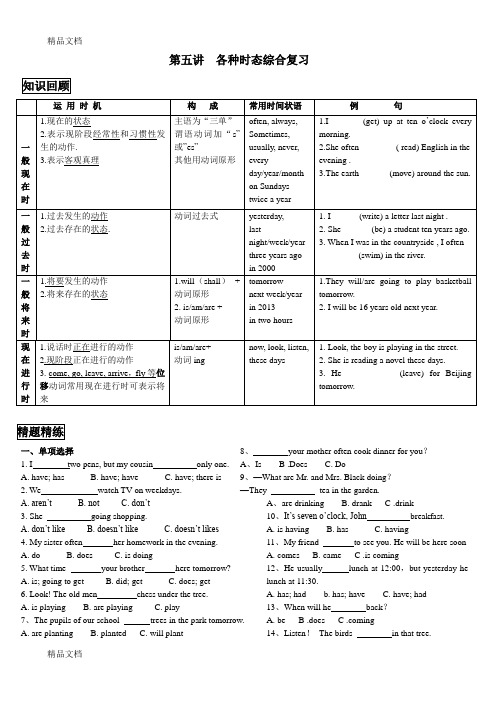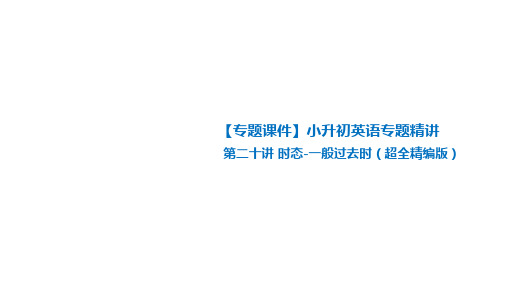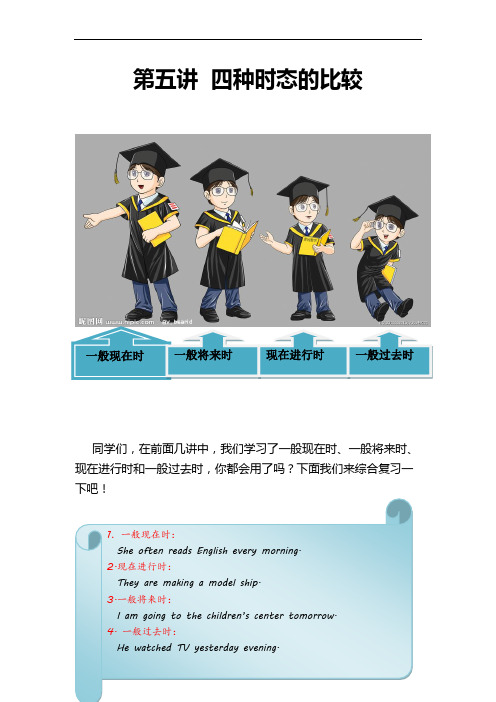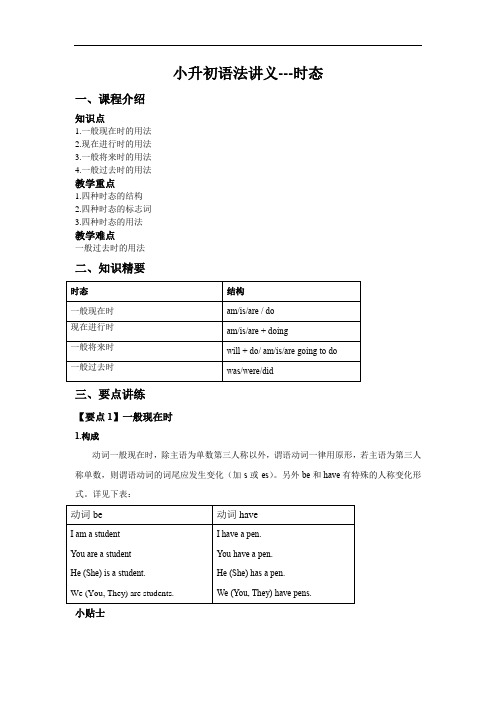小升初时态综合培训讲学
小升初时态复习(讲义)人教PEP版英语六年级下册

【激趣引新】
单词接龙游戏
【新课讲授】
一.单词(常考的过去式)
clean—cleaned打扫stay—stayed停留wash—washed洗watch—watched看read—read读
sleep—slept睡觉see—saw看见go —went去fish钓鱼ride—rode骑hurt—hurt受伤
fall off—fell off掉落,摔倒
三、句子
1. What did you do last weekend?你上个周末做了什么事?
2. How was your weekend? It was fine ,thanks.你周末过得怎么样?很好,谢谢。
3. What happened?怎么了?
改成一般过去时:_____________________________________________________
改成一般将来时:__________________________________________________
2.翻译:她通常在周末做家务。__________________________________________
()5.We are playingfootball. Our teacher is playing with.
A. the, us B. the, the C. /, us
()6.Tim isEnglish boy. He speaks English very.
A. a, well B. an, good C. an, well
A. works B. work C. working
小升初四大时态 讲义

一般现在时一. 意义:表示经常发生的事情,动作或存在的状态二. 构成及变化1.be动词的变化。
肯定句:主语+be(am,is,are)+其它。
如:I am a boy.我是一个男孩。
否定句:主语+ be + not +其它。
如:He is not a worker.他不是工人。
一般疑问句:Be +主语+其它。
如:-Are you a student? -Yes. I am. / No, I'm not.特殊疑问句:疑问词+一般疑问句。
如:Where is my bike?2. 行为动词的变化。
当主语为第一,二人称及复数时,助动词为do肯定句:主语+动词原形(+其它)。
如:We often play basketball after school.否定句:主语+ don't+动词原形(+其它)。
如:we don’t play basketball after school.一般疑问句:Do +主语+动词原形+其它?如:Do you often play basketball after school l? Yes, we do. / No, we don't.特殊疑问句:疑问词+以do开头的一般疑问句?如:What do you often do after school ?当主语为第三人称单数时,助动词为does肯定句:主语+动词三单式(+其它)。
如:He swims well.否定句:主语+ doesn’t+动词原形(+其它)。
如:He doesn’t swim well..一般疑问句:Does +主语+动词原形+其它。
如:Does he swim well ? Yes, he does. / No, he doesn't.特殊疑问句:疑问词+以does开头的一般疑问句?如:How does your father go to work?三.第三人称单数的动词变化规则(只有在第三人称为主语的肯定句中,动词才用三单式)(1)多数动词直接加s:runs gets likes collets takes plays climbs…….(2)结尾是s, x, sh, ch, o,前为辅音字母,结尾加es :watches teaches goes does washes crosses mixes brushes(3)动词末尾y前为辅音:将y改为i加es: study→studiesfly→flies carry→carries cry→cries但在y前如果为元音则直接加s:buys says四.时间标志:always , usually , often , sometimes ,every…现在进行时一.意义——当表示现在正在进行的动作或正在发生的事。
小升初英语讲解时态:一般现在

小升初英语总复习精讲精练之动词时态(1) 一般现在时【精讲】前段时间,我们梳理了小升初英语常考的词法,从今天开始,我们一起看看小升初英语常考的时态。
今天先来复习第一部分:一般现在时。
一般现在时,表示通畅性、规律性、习惯性的动作或状态。
那么在考试中怎样判断句子中应该用什么时态呢?首先我们一起看看一般现在时的关键词。
[关键词]always(总是), often(经常), usually(通常), sometimes(有时), never(从不), every day(每天)/ week(每周)/ month(每个月)/ year(每年), once/ twice/ three times a day / week / month / year(每天/每周/每月/每年一次/两次/三次......)。
如果句子中出现以上关键词,那么这个句子要用一般现在时。
那么一般现在时又有哪些人称之分呢?[人称]1、单三人称:he, she, it以及所有能够用he,she,it所代替的人称。
2、非单三人称:除单三人称以外其他的人称。
为什么在一般现在时中,我们要把人称分为以上两种呢?这也是小升初考试的一个考点,即:在一般现在时中,主语如果是单三人称,谓语动词要在词尾+s或es(动词单三人称的变化规则同名词单数变复数),主语如果是其他人称,谓语动词用原形。
[构成形式]一般现在时的构成形式分为两种:一种是含有be动词,另一种是含有实意动词。
我们一起通过下面两个表格看看这两种形式有什么区别:我们一起看看下面几个例句:1、I drink milk every day. 我每天都喝牛奶。
2、He likes playing tennis.他喜欢打网球。
3、I don’t speak French.我不讲法语。
4、Where is my skirt ?我的裙子在哪里?5、Does he get up early every morning? 他每天都起床很早吗?【精练】一、用括号内所给动词的适当形式填空。
小升初英语总复习四大时态综合课件

基本用法 1.表示现在正在进行的动作和产生的事 e.g. -What are you doing?
-I am reading a book.
2.有时表示现阶段正产生的事,但此刻动作不一定 正在进行
e.g. He is teaching at the school. We are learning Unit 5 these days.
1.一般现在时
(1)表示经常产生或习惯性的动作或状态 We often write to each other. 常与always,usually,often,sometimes…连用。
(2)表示主语现在的性情、特征、能力 He works hard.他努力工作
(3)表示客观事实或普遍用法 The XXX rises in the east. Light goes faster than sound
动词过去式变化规则
• 1.一般在动词末尾加-ed; 如:work-worked, cook-cooked
• 2.结尾是e加d; 如:live-lived
• 3.末尾只有一个元音字母和一个辅音字母的重 读闭音节,应双写末尾的辅音字母,再加-ed; 如:stop-stopped
• 4.以“辅音字母 y”结尾的,变y为i,再加-ed。 如:study-studied
【No. 2】一般现在时的变化
• 1. be动词的变化 • 否定句:主语+be not+其它. • He is not a worker.他不是工人。 • 一般疑问句:Be+主语+其它?-Are you a student? • -Yes. I am. / No, I'm not. • 特殊疑问句:疑问词+一般疑问句? • Where is my bike?
小升初 时态综合复习(教师版)培训讲学

第五讲 各种时态综合复习一、单项选择 1. I two pens, but my cousin only one. A. have; has B. have; have C. have; there is 2. We watch TV on weekdays. A. aren’t B. not C. don’t 3. She going shopping. A. don’t like B. doesn’t like C. doesn’t likes 4. My sister often her homework in the evening. A. do B. does C. is doing 5. What time your brother here tomorrow? A. is; going to get B. did; get C. does; get 6. Look! The old men chess under the tree. A. is playing B. are playing C. play 7、The pupils of our school trees in the park tomorrow. A. are planting B. planted C. will plant 8、 your mother often cook dinner for you ? A 、Is B .Does C. Do9、—What are Mr. and Mrs. Black doing ? —They tea in the garden. A 、are drinking B. drank C .drink 10、It’s seven o’clock, John breakfast. A. is having B. has C. having 11、My friend to see you. He will be here soon A. comes B. came C .is coming 12、He usually lunch at 12:00,but yesterday he lunch at 11:30. A. has; had b. has; have C. have; had 13、When will he back ? A. be B .does C .coming 14、Listen ! The birds in that tree.A. are singingB. is singingC. sing 15、My uncle to work of foot before. A. went B. goes C. will go 16、The farmers are . A. work hard B. hard work c. working hard 17、We a picnic next Sunday. A. are going to have B. had C. have 18、—When your uncle to Guangzhou —Last year. A. does; come B. did; came C. did; come 19.We Chinese lesson yesterday afternoon. A. don’t have B. didn’t have C. hadn’t 20.The meeting for half hour. A. last; an B. lasted; a C. lasted; an 21.He turned on TV and the football match. A. watches B. watched C. watching 22、You mustn’t put your bike outside at night. A thief it away. A. will take B. is taking C. took 23、He in the exam last week. A. did well B. does well C. do good 24、He studied hard and others. A. took up with B. caught up with C. catches up with 25.We many photos in the countryside last week. A. take B. are taking C. took 26、I you this morning but you at home. A. call; wasn ’t B. called; weren ’t C. called; wasn ’t 27 、—You look sad. What ? — I the exam. A. did happen; didn’t pass B. happened; didn’t pass C. happened; passed 28. I a book in the bookshop but I forgot it. A. buy; to bring B. bought; to bring C. bought; brought 29、1 my pen but I coul dn’t it. A. looked for; find B. looked ;found C. found; look for 30 — you to the radio ? —No ,you can turn it off. A. Did ;listen B. Are; listening C. Do ;listen 二、找标志、定时态、写动词 1. There (not be) any water on the moon. 2. She comes into the room quietly because her parents (sleep ). 3. His father (not be) at home yesterday. He was at work. 4. After he got up, he (wash) his face and (brush) his teeth. 5. He (get) to school early this morning. 6. When my grandpa was young ,he (live)in a small village. 7. Where he (work)when he was young? 8. He (have) much work to do yesterday. He (work) all day. 9. My mother (not watch)TV last night because she (have) a lot of work to do. 10.Yesterday I (go) climbing with my uncle. 11. They said to John.“ We hope you (not forget) us.” 12. My uncle (go) to Beijing next week. 13. Don’t worry! We can get to the station in time and we (not miss) the train. 14.—Where is Mike ? —He (put) on his sport shoes in the room. He (play) football with his friends.15. Listen! Someone (cry) in the next room. 16. Her parents (live) a poor life before 1949. 17. Listen! Who (speak) English in the classroom? 18. Betty (be) thirteen years old next year. 19. —What can I do for you? —I (buy)a watch here last week. But is (not work). 20.They (help)the farmer with their work last October. 21. There (be) a class meeting next Monday afternoon. 22. It’s 6:30. Tom (get) up. 23. When he was young ,he (not have) enough money. 24. Look at the black clouds. It (rain) soon. 25. He ____ (listen) to the weather report now. He ___ (visit) the Great Wall tomorrow. 26. Ten years ago our home own __________(not be) as big as it (be) now.27. Ann ran to the door and ______ (find) Li Lei outside. 28. Be careful! The car (come). 29. Don’t speak to me! I _______ (write) a composition (作文) 30. I’m sorry I (not know) you (leave) your pen here when you (come) to see me the other day.三、连词成句1. going,visit,to,we,museum,Sunday,this,are,the2. watched,he,TV,half,hour,an,for,night,last3. Mary. does,homework,often,the,in,evening,her4. was,there,an,old,house,here,before5. we,go,this,swimming,shall,afternoon?四、句型转换1、He often does eye exercises.(改为一般疑问句)he often eye exercises?2. He often swam in the river before.(改为一般疑问句)he often eye exercises?3. May usually has lunch at school(改为否定句)May usually lunch at school4. We took some photos in the park yesterday.(改为否定句)We photos in the park yesterday.5. My father went to work on foot before.(根据划线部分提问)Your father to work before?6. The children are playing football on the playground.(根据划线部分提问)are the children on the playground?7. He often gets up at 6:30 on weekdays.(根据线划部分提问)he often up on weekdays?第五节一、1-5:ACBBA 6-10:BCBAA 11-15:CBACA 16-20:CACBC 21-25:BAABC26-30:CBBAB二、1. isn’t 2. are sleeping 3. wasn’t 4. washed; brushed 5. got 6. lived 7. did; work8. had; worked 9. didn’t watch; had10. went 11. won’t forget 12.is going to/will go13. won’t 14. is putting; is going go play 15. is crying 16. lived 17. is speaking18. will be 19. bought; doesn’t work 20. helped 21. is going go/will be 22. is getting23. didn’t have 24. is going go rain 25. is listening; is going go/will be 26. wasn’t; is27. found 28. is coming 29. am writing 30. didn’t know; left; came三、1. We are going to visit the museum this Sunday.2. He watched TV for half an hour last night.3. Mary often does her homework in the evening4. There was an old house here before.5. Shall we go swimming this afternoon?四、1. Does; do 2. Did; swim 3. doesn’t; have 4. didn’t take any 5. How did; go6. What; doing7. What time does; get8. does; in9. studies harder 10. goes to; by car五、1. matter 2. forgot 3. wasn’t 4. worry5. found6. handed7. yours8. telling9. Where 10. putting 11. on 12. What13. football 14. Does 15. good六、1-5:ABAAB 6-10:BBAAB七、1-5:BCBCB。
小升初英语时态复习讲义-最新

小升初英语时态复习讲义·最新说明:本文整理了小升初英语时态复习的讲义内容,文档的内容主要来源精品讲义的整理,同时重点参考了历年考试的知识点和易错点,本文是小升初英语专项复习的最好选择,希望对广大同仁有所帮助。
目录第一部分:一般现在时 (3)一、知识整合 (3)二、句型转换 (4)三、同步练习 (5)第二部分:现在进行时 (6)一、知识整合 (6)二、同步练习 (6)三、巩固练习 (7)四、课后作业 (9)第三部分:参考答案 (14)一、一般现在时答案 (14)二、现在进行时答案 (14)三、巩固练习答案 (14)四、完形填空答案 (15)五、阅读理解答案 (15)第一部分:一般现在时一、知识整合(一)概念一般现在时表示现在的时间内经常发生的动作或存在的状态。
具体为:1.表示经常性或习惯性的动作。
如:I get up at five every morning.我每天早上五点钟起床。
It often rains there in spring.那儿春天经常下雨。
2.表示人或事物现在的特征、状态或能力等。
如:He likes drawing.他喜欢画画。
They can play basketball.他们会打篮球。
3.表示客观存在的事实或真理等。
如:Twenty and thirty is fifty.二十加三十等于五十。
The Earth goes around the Sun.地球绕着太阳转。
易错提示:含有表示想法、喜好或者感觉的动作一般用一般现在时表达,而不用现在进行时。
常见的动词有:want(想要),like(喜欢),love(爱),wish(希望),hope(希望),think(认为),understand(理解),mean(意思是),need(需要),see(看见),hear(听到),feel(感觉到)等。
(二)基本结构1.一般现在时的肯定句的基本结构(1)be动词:主语+is/am/are+其他。
人教版(PEP)小学英语小升初时态课件

四、一般过去时 一般过去时表示过去某个时间产生的动作或存在 的状态。 (一)时间状语:last year/week,yesterday,just now
(二)结构 1.肯定句:主语+was/were+其他. I was ill yesterday.昨天我生病了。 否定句:主语+was/were+not+其他. I wasn’t ill yesterday.昨天我没有生病。 一般疑问句:Was/Were+主语+其他?
当主语是第三人称单数时: ①肯定句:主语+动词第三人称单数+其他. She cleans the room every day. 她每天打扫房间。 ②否定句:主语+助动词(doesn’t)+动词原形+其他. She doesn’t clean the room every day. 她不是每天打扫房间。
二、一般现在时 一般现在时是表示经常产生的动作、存在的状态 或习惯性的动作的时态。常用的时间状语有:often, sometimes,usually,in the morning/afternoon/evening, every week/day/year等。
(一)构成 1.表示目前的状态,谓语动词用be动词。 肯定句:主语+be动词+其他.
时态
一、现在进行时 现在进行时表示现在正在进行或产生的动作。 (一)结构:be(am,is,are)动词+现在分词(动词-ing情 势) (二)现在进行时的标志词有now,look,listen等。 I’m playing football now. 我现在正在踢足球。
Look!The girl is reading a book. 看!那个女孩正在看书。 Listen!The bird is singing. 听!小鸟正在唱歌。
小升初英语专题精讲第二十讲时态-一般过去时(超全精编版)课件

第二十讲 时态-一般过去时(超全精编版)
新知导入
一、一般过去时的概念及作用 1.一般过去时表示过去某个时间产生的动作或存在的状态,常和表示过 去的时间状语连用。例如:
我妈妈的手提包刚才在沙发上。 My mother's handbag was on the sofa just now. 上周我们去了农场。 We went to the farm last week.
【解析】[分析]句意:孩子们正玩得愉快。原句为现在进行时。用last week(上周) 替换now以后要用一般过去时,last week放在句后。have的过去式是had,故答案为: The children had a good time last week. [点评]考察句型转换,辨认出last week用在一般过去时,注意动词have的变化。
一般过去时的构成:
课堂总结
1.be动词在一般过去时中的变化:am和is在一般过去时中变为was。are在一般过
去时中变为were。
带有was或were的句子,其否定式、疑问式的变化和is, am, are一样。即否定句在
was或were 后加not,一般疑问句把 was或were调到句首。
2、没有be动词的一般过去时的构成:在构成否定句及疑同句时一般都借助助动词
二、一般过去时的构成
新知讲授
1.be动词在一般过去时中的变化:
are在般过去时中变为were,用于第二人称和第一、第三人称的复数情况。
例如:
我们是新朋友。
We are new friends. 我们上周是新朋友。 We were new friends last week.
新知讲授
小升初复习讲义小升初时态复习

小升初复习讲义小升初时态复习小升初复习讲义:小升初时态复习在小学英语学习中,时态是一个非常重要的语法知识点。
对于即将面临小升初考试的同学们来说,系统地复习时态知识,能够帮助大家更好地理解和运用英语,在考试中取得优异的成绩。
接下来,让我们一起深入学习和复习一下小学阶段常见的几种时态。
一、一般现在时一般现在时表示经常发生的动作或存在的状态。
它的构成比较简单,当主语是第三人称单数(he、she、it)时,动词要发生相应的变化,通常在动词后面加“s”或“es”;其他人称则用动词原形。
例如:I go to school every day(我每天上学。
)He likes playing football(他喜欢踢足球。
)一般现在时的时间状语通常有:always(总是)、often(经常)、sometimes(有时)、usually(通常)、every day/week/month/year(每天/每周/每月/每年)等。
在做一般现在时的题目时,要注意主语的人称和单复数,以及动词的形式变化。
二、现在进行时现在进行时表示正在进行的动作。
它的构成是“be 动词(am/is/are)+动词的现在分词(动词 ing 形式)”。
比如:I am reading a book now(我现在正在读书。
)They are playing basketball(他们正在打篮球。
)现在分词的构成规则有:1、一般情况下,直接在动词后面加“ing”,如:read reading。
2、以不发音的“e”结尾的动词,去掉“e”再加“ing”,如:write writing。
3、重读闭音节结尾的动词,双写末尾的辅音字母再加“ing”,如:run running。
现在进行时的时间状语有:now(现在)、at the moment(此刻)等。
三、一般过去时一般过去时表示过去发生的动作或存在的状态。
动词要用过去式,规则动词的过去式通常在动词后面加“ed”,不规则动词的过去式则需要特殊记忆。
小升初英语时态讲解与归纳教案

小升初英语时态讲解与归纳教案教学目标:1.学生能够理解和正确使用英语的各种时态;2.学生能够根据句子所表达的时间和动作情况正确选择适当的时态。
教学内容:1.现在时态;2.过去时态;3.将来时态。
教学重点:1.能够正确理解和使用现在时态;2.能够正确理解和使用过去时态;3.能够正确理解和使用将来时态。
教学难点:1.如何正确运用现在时态;2.如何正确运用过去时态;3.如何正确运用将来时态。
教学准备:1.PPT或教学板书;2.练习题集。
教学过程:Step 1:导入(5分钟)教师通过问答的方式复习学生已经学过的时态,以总结的方式引入新的学习内容。
Step 2:讲解与示范(15分钟)1.现在时态教师通过PPT或板书,讲解现在时态的构成和用法,并通过示例句子进行示范。
同时,教师可以给学生提供一些常用动词的现在时态变化规则。
2.过去时态教师通过PPT或板书,讲解过去时态的构成和用法,并通过示例句子进行示范。
同时,教师可以给学生提供一些常用动词的过去时态变化规则。
3.将来时态教师通过PPT或板书,讲解将来时态的构成和用法,并通过示例句子进行示范。
同时,教师可以给学生提供一些常用动词的将来时态变化规则。
Step 3:练习与巩固(30分钟)教师给学生分发练习题,让学生根据句子的时间和动作情况选择适当的时态填空。
然后,教师逐一点评答案,并解释每个时态的运用原则和特点。
Step 4:拓展与应用(15分钟)让学生根据所学的时态知识,完成一篇短文的写作任务。
教师提供一个话题,让学生以此为基础,运用适当的时态进行写作。
然后,学生互相交流并互相修改。
Step 5:总结与展望(5分钟)教师引导学生总结现在时态、过去时态和将来时态的构成和用法,并展望下一节课的学习内容。
教学扩展:1.学生自主运用所学的时态知识,进行对话练习。
2.学生可通过听歌、看电影等方式,寻找并总结时态的使用情况。
小升初英语时态复习讲义.doc

英语时态专题复习一、一般现在时:1、现在的状态2、经常或习惯性动作3、客观真理1、标志:often (经常)‘usually (通常)^sometimes (有时)^always (总是),never (从不),on Sundays (在星期天),every day/month/year (每一天/月 /年)例:He usually wakes up at 7 o'clock.The sun rises in the east・二. 现在进行时:表示说话瞬间或现阶段正在进行的动作。
1、标志:now (现在)listen (看)look (听)2、结构:主语+助动词be(am/is/are)+行为动词的现在分词(doing)现在分词的构成:l.-ing: eat-eating 2•辅音字母+e: take-taking3. sit, put, begin, run, swim, stop, get, shop,(双写最后一个辅音字母,再加ing.)二.现在进行时:is/am/are +现在分词补充:2.表|现阶段J正进行的动作。
A ・ He is taking physics this semester (本学期)。
A. We are preparing for our final examination this week.3.go, come, leave, arrive, land, meet, die, start, return, join, etc. 用于进行时态时表示即将开始的动作。
A・ Look! The bus is coming.看!车来了!►・ The old man is seriously ill, and he is dying・A. Alice is leaving for Beijing with her mother.4.与always, forever, continually等副词连用,表示说话人带有感情色彩:赞赏或厌恶。
人教版(PEP)小升初总复习—时态课件

6. They are going to_h_a_v_e__( have) an atr lesson. 7. He will c_l_e_a_n(clean) the classrom after school.
如:—Are you a student? —Yes. I am. / No, I'm not.
特殊疑问句:疑问词 + 一般疑问句? 如:What is his job?
2、含有实义动词
肯定句: 主语+ 动词+(其他). 否定句:主语 + don’t / doesn’t + 动原+( 其它)。
如:He doesn't often play. 一般疑问句:Do / Does + 主语 + 动原 +(其它)。
7. He _r_e_a_d__(read) a book last night.
练习
1. It _w_a_s_ (be) Mike’s birthday last Friday. 2. We all __h_ad_ (have) a good time last night. 3. She _r_e_a_d_a book yesterday. (read) 4. Jim didn’tg_o___(go) home yesterday. 5. I didn’t _f_e_e_l ( feel ) very well yesterday .
练习
1. He _is__w_a_t_e_ri_n_g(water) the trees now. 2. Look!she i_s_s_i_n_g_in_g(sing) in the classroom. 3. What __ar_e_ you d_o_i_n_g__(do) now? 4. The boy i_s_d_r_a_w_i_n(gdraw) a picture now. 5. My mother i_s_c_o_o_k_i_ng_( cook ) some fish now.
通用版小学英语小升初四大时态串讲课件

wweent FFdeeidb.. Mwaasrr.. Atoporrk.. bMMouagyyh..t JmJuuanndeee..
began swam
Jsueley Atuegacuhst Septeeamt ber Ocrtuonber Novseinmg ber
meet
get
评价标准
1. 认真思考 2. 回答正确
+10 +10/点
总结(填一填)
情势
现在分词(ing) 过去式 单三
变化规则
总结 情势
变化规则
1. 一般词尾ing 现在分词(ing) 2. 哑巴e,去e加ing
过去式 单三
1. 一般词尾ed 2. 哑巴e,去e加ed
4. 辅y结尾,y变i,再加ed 1. 一般词尾加s 2. 哑巴e,去e加es 3. 辅y结尾,y变i加es 4. 以s/x/sh/ch/o结尾加es 5. have-has
walk-- walked plant-- planted
clean-- cleaned cry-- cried
collect-- collected invite-- invited
stop-- stopped
farm-- farmed
close-- closed
like-- liked
dance-- danced
评价标准
1. 认真思考
+10
2. 展示正确
+10
乘胜追击 1
学生要求
1. 独自找出习题的标志词,
并做答
3m
评价标准
2. 故事接龙获得展示权
1. 认真做题
+10
小升初英语时态综合复习

第五讲四种时态的比较四种时态的结构比较时态基本结构一般现在时1)动词原形(如主语为第三人称单数,动词上要加(e)S)2) am/is/are + 形容词/名词。
现在进行时am/is/ are + doing一般将来时1)am/is/are/going to + do2)will + do一般过去时1)was/were+形容词/名字2)行为动词(动词过去式)四种时态的动词变化将来时动词用原形!注意一、用所给动词的适当形式填空。
1. Listen! The children _______________(sing)in the classroom.2. The kite _____________ (be) broken last week.3. Look! The woman over there ______________ (look) at you.4. Mary ______________ (visit) her grandparents next Monday.5. Miss Li ______________(have) an English class every Tuesday.6. I ______________ (leave) for Shanghai tomorrow evening.7. Joan often ______________ (catch) the No.11 bus to work.8. He _____________much about Chinese.(not know)9.Tom often ______________(go) to school on foot. But yesterday was rainy. He _______ (go) to school by bus.10. My mother usually ____________(watch) TV and ___________(wash) clothes on Sunday morning?11. I ____________(make) a model ship with Mike last Saturday.12. Today is a sunny day. We ______________ (have) a picnic this afternoon.13. ______________your sister often ______________(go)shopping?14. The boys ________________ (swim) in the river now.二、单项选择。
小升初语法讲义---时态

小升初语法讲义---时态一、课程介绍知识点1.一般现在时的用法2.现在进行时的用法3.一般将来时的用法4.一般过去时的用法教学重点1.四种时态的结构2.四种时态的标志词3.四种时态的用法教学难点一般过去时的用法二、知识精要三、要点讲练【要点1】一般现在时1.构成动词一般现在时,除主语为单数第三人称以外,谓语动词一律用原形,若主语为第三人称单数,则谓语动词的词尾应发生变化(加-s或-es)。
另外be和have有特殊的人称变化形式。
详见下表:小贴士2.用法 a .表示经常发生的动作、行为或存在的状态。
标志词:1)频度副词often, usually, always, sometimes, seldom, never,2)every 系列every day/week/ year …等。
例如: I go to school every day except Sunday.除了星期日,我每天上学。
b .表示一种客观事实或普遍真理,或在谚语中。
例如: The earth moves/ goes around the sun. 地球绕着太阳转。
【例题】The students of Class One _____ an English class every day. A. hasB. haveC. hadD. having【即学即用】My friend, Lucy from Canada.A. beB. comeC. comesD. are【要点2】现在进行时1.构成现在进行时由助动词be 的人称形式加动词的现在分词构成。
它的肯定式,否定式及疑问式的结构如下:1.一般现在时的三单用法:当主语是第三人称单数时,谓语动词用第三人称的单数形式。
谓语动词的第三人称单数形式的变化规则如下:1)一般在动词后直接加s 。
如:talk –talks, live –lives, stay-stays 。
2)以s, x., ch, sh 或o 结尾的动词在其后加es 。
- 1、下载文档前请自行甄别文档内容的完整性,平台不提供额外的编辑、内容补充、找答案等附加服务。
- 2、"仅部分预览"的文档,不可在线预览部分如存在完整性等问题,可反馈申请退款(可完整预览的文档不适用该条件!)。
- 3、如文档侵犯您的权益,请联系客服反馈,我们会尽快为您处理(人工客服工作时间:9:00-18:30)。
小学六年级英语讲义语法考点一般现在时态一、一般现在时:表示习惯性或经常发生的动作和客观存在的现象。
1.表示经常的或习惯性的动作,常与表示频度的时间状语连用。
Peter usually goes to school by bike.2.表示主语具备的性格、能力和特征。
Miss Zheng teaches English.3.表示现在的状态。
It is cold.4.表示客观事实和普遍真理。
The earth moves around the sun.★标志:often(经常),usually(通常),sometimes(有时),always(总是),never(从不), on Sundays(在星期天), every day/month/year(每一天/月/年)例:I go to school every day. He is a boy.一般现在时的构成❖ 1. be动词:主语+be(am,is,are)+其它。
Eg:I am a boy.我是一个男孩。
❖ 2.行为动词:主语+行为动词(+其它)。
Eg:We study English.我们学习英语。
注:当主语为第三人称单数(he, she, it)时,要在动词后加"-s"或"-es"。
如:Mary likes Chinese.玛丽喜欢汉语。
一般现在时的变化❖ 1. be动词的变化。
♥否定句:主语+ be + not +其它。
Eg:He is not a worker.他不是工人。
♥一般疑问句:Be +主语+其它。
Eg:-Are you a student? -Yes. I am. / No, I'm not.♥特殊疑问句:疑问词+一般疑问句。
Eg:Where is my bike?❖2.行为动词的变化。
♥否定句:主语+ don‘t( doesn’t ) +动词原形(+其它)。
Eg:I don‘t like bread.当主语为第三人称单数时,要用doesn’t构成否定句。
Eg:He doesn't often play.♥一般疑问句:Do( Does ) +主语+动词原形+其它。
Eg:- Do you often play football? - Yes, I do. / No, I don't.当主语为第三人称单数时,要用does构成一般疑问句。
Eg:- Does she go to work by bike? - Yes, she does. / No, she doesn't.♥特殊疑问句:疑问词+一般疑问句。
Eg:♤My father goes to work by bike.How does your father go to work?♤My mother likes to go shopping in the weekends.What does your mother do in the weekends?☆注意☆当主语是第三人称单数时,须在动词词尾加-s或-es。
例:He often goes to school at 7:30.Her mother works in a hospital.现在进行时态二、现在进行时:表示说话时正在进行的动作或现阶段一直在进行的动作。
★标志: now(现在)listen(看)look(听)构成:be ( is/am/are) + ~ ing例:I’m writing a letter now.They’re swimming.Look! Amy is reading an English book.☆注意☆动词的ing形式的构成规则:①直接加上ing , 如doing , going , working , singing , eating②以e 结尾的动词,要先去e再加ing,如having , writing③sit, put, begin, run, swim, stop, get, shop,(双写最后一个辅音字母,再加ing.)句型转换1.肯定句转换成否定句,要在be 后加not 构成eg. We are reading English now.∀We are not reading English now.2.陈述句转换成一般疑问句,把be动词提到句首eg. The student is drinking.∀ Is the student drinking?3.陈述句转换成特殊疑问句,由“疑问词+一般疑问句”构成eg. He is working.∀ What is he doing?一般将来时三、一般将来时:表示在将来会发生的事或动作。
常与表示将来的时间连用,如:tomorrow(明天), next week(下周), next year(明年), in a few days(几天之后)等。
构成:①be going to + 动词的原形②will/shall + 动词的原形例:She is going to Hong Kong next week.You will see many birds in the sky.句型转换:肯定句Students will go to school in the future.主语+ will +动词原形+(宾语)+其他改为否定句:____________________________在will 的后面加not即可。
will not 可缩写为won’t改为一般疑问句:____________________________________把will 提到句子主语之前,结尾变问号。
改为特殊疑问句:____________________________________特殊疑问词+will +主语+动词原形+其他?❖对划线部分提问:一般情况,一般将来时的对划线部分有三种情况。
❖ 1. 问人。
WhoEg:I’m going to(will) New York soon. →Who’s going to(will) New York soon.❖ 2. 问干什么。
What … do.Eg:My father will watch a race with me this afternoon. →What will your father do with you this afternoon.❖ 3. 问什么时候。
When.Eg:She’s going to go to bed at nine. →When is she going to bed?❖六、同义句:be going to = willEg: I am going to go swimming tomorrow.= I will go swimming tomorrow.一般过去式四、一般过去时:表示过去发生的动作或事情。
它经常与表示过去的时间连用:last week(上周), yesterday(昨天), last year(去年), ago(之前)等。
例:I went to a park yesterday.I went on a big trip last weekend.❖Be动词在一般过去时中的变化:❖⑴am 和is在一般过去时中变为was。
(was not=wasn’t)❖⑵are在一般过去时中变为were。
(were not=weren’t)☆注意☆动词的过去式的构成规则有:A、规则动词①一般直接在动词的后面加ed,如worked , learned , cleaned , visited②以e结尾的动词直接加d;如lived , danced , used③以辅音字母加y结尾的动词,要改y为i再加ed,如study – studied;carry – carried;worry– worried (play、stay除外)④双写最后一个字母,如stoppedB、不规则动词。
记住以下动词的原形和过去式:sing – sang , eat – ate , see – saw , have – had , do – did , go – went , take – took , buy – bought , get – got , read – read , fly – flew , am/is – was , are – were , say – said , leave – left , swim – swam , tell – told , draw – drew , come – came , lose – lost , find – found , drink – drank , hurt – hurt , feel – felt句型转换:否定形式①was/were+not;②在行为动词前加didn't,同时还原行为动词一般疑问句Did+主语+do+其他+?She often came to help us last year.I was not a teacher five years ago.I didn't know you were so busy just now.Did you go to school yesterday?三、专题训练一)、选择题()1 -He came early this morning, didn't he?-Yes, he did. He often___ to school early.A. comeB. comesC. cameD. has come()2 The sun ___ in the east and___ in the west.A. raises; setB. rise; setsC. rises; setsD. rises; set()3 She will go if it ___ tomorrow.A. isn't rainB. don't rainC. doesn't rainD. didn't rain()4.1 ______ you ___ your homework now?A. Do; doingB. Are; doingC. Were; doingD. Does; do()5.My father___ breakfast at home every day.A. hasn'tB. isn't havingC. doesn't haveD. has had()6. There___ two English films next week.A. is going to beB. are going to haveC. will haveD. are going to be()7. -_____ they often ___ these old men?-Yes, they___.A. Do; help; areB. Are; helping; areC. Do; help; doD. Are; helped; are ()8. These little boys___ playing football.A. are likingB. likeC. likesD. were liking()9. We won't go to the Great Wall if it ___ tomorrow.A. snowsB. snowedC. snowD. will snow()10. ___ he ___ a good time last Sunday?A. Were; wereB. Did; doC. Did; hasD. Did; have()11. When he was a child, he____ in the garden in the morning.A. always playsB. always playedC. plays alwaysD. played always()12. -What is he doing now?-He___a picture.A. drawsB. drewC. is drawingD. was drawing()13 . ____ she _____ her homework every day?A. does; doB. do; doesC. Does; doD. Do; Does()14. They _____ home by bike sometimes.A. goesB. don’t goC. doesn’t goD. went()15 . Look! The children___kites over there.A. flewB. flyC. are flyingD. were flying()16. He ______ that film last weekend.A. seeB. didn’t sawC. didn’t seeD. doesn’t saw二)根据动词的适当形式填空。
